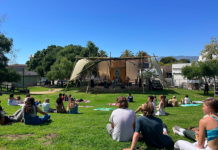Gwendolyn Wu
The Regents of the University of California voted 14-7 to approve a gradual tuition hike, which will increase tuition as much as five percent per year, on Nov. 20 at the University of California, San Francisco.
The plan projects a tuition increase from $12,192 for California residents during the 2014-2015 school year to $15,564 for the 2019-2020 school year. Tuition for out-of-state students will be raised from $22,878 during the 2014-2015 school year to $29,202 during the 2019-2020 school year.
On Nov. 19, the Regents voted to approve a budget of nearly $27 billion for the 2015-2016 academic year, including an outline for the tuition hike and its uses. Money from the tuition increase will be used to increase funding for incoming freshmen and transfer students, accommodating up to 5,000 more students in the system. Additionally, the board plans to use some of the money generated to increase funding for scholarships and grants, including the recently implemented Middle Class Scholarship Program, which provides scholarships for undergraduate students with incomes up to $150,000.
The tuition hike will go forward if the state government does not allocate more funding for the public higher education system. Many of the Regents have made it clear that the tuition hike is a last resort in response to less funding, blaming Sacramento for the widening financial gap. In particular, UC President Janet Napolitano has been vocal about how crucial the hike is, insistent that it is being done to maintain current university faculty and staff salaries, increase the number of faculty hired, and add more undergraduates to the system.
“Accessibility, affordability and academic excellence — these are the university’s constant stars,” said Napolitano. “And sound stewardship demands that we make the necessary choices to keep UC on a course true to the path these stars provide. This plan, in my view, does just that.”
Tuition has been the greatest source of UC revenue since the 2011-2012 school year, trying to compensate for the $460 million budget shortfall from state funding levels in 2008. Tuition fees have also been frozen during the past three years. The rising costs of tuition are a sharp contrast to what the Office of the President claimed was a drop in the costs of educating a single student in the UC system back in September, at a previous Regents meeting.
Gov. Jerry Brown, who also serves on the Board of Regents, voted no on the tuition hike, as did Lt. Gov. Gavin Newsom, Assembly Speaker Toni Atkins, Superintendent of Public Instruction Tom Torlakson, Student Regent Sadia Saifuddin, Assembly Speaker John Perez, and Long Beach City College President Eloy Oakley. Brown appointed Perez and Oakley to the board earlier this week, in hopes of swaying the vote.
Brown insists that the Regents should be looking at alternate, more creative approaches to enhancing education while cutting costs. The governor has suggested creating more online classes, granting credits for internships, and structuring consistent lower division requirements at all campuses for starters.
“The pressure of not having enough money can force creativity that otherwise can’t be considered,” said Brown. “The only way to keep costs down is to change the cost structure in a more fundamental way than you now have an appetite to.”
Over 300 students from schools in the UC system traveled to San Francisco to protest the tuition hike. Student protesters tried to physically keep the Regents from voting, forming a human chain to keep them from entering the building on Nov. 19, when a key committee of Regents voted 7-2 to move the proposal forward. Other protesters spoke up before and during the voting process, chanting slogans like “Hey, hey, ho, ho, tuition hikes have got to go” and “No cuts, no fees, education should be free” at the Regents.
Some protested the Board of Regents’ decision to increase salaries of senior management officials. Others directed attention at how the Regents did not announce their plan to vote on the tuition hikes sooner, preventing students from taking action beforehand, as many protesters mentioned during the public comment section of the open board meeting.
“Protests are great, but meeting with people, talking to the state legislators, writing to the media [could be more effective],” said Lacy Wright, a first-year art history major who attended the UCSF protests. “Our voices and opinions need to be heard before things go to vote.”
As students wait to see if state funding will increase, they will continue to protest the tuition hikes on campus. Associated Students UCSB Lobby Corps will continue to push state legislature to increase funding for the UC system, in hopes that tuition hikes will be kept to a minimum.
















